(完整word版)高中英语-省略句
高中英语省略句
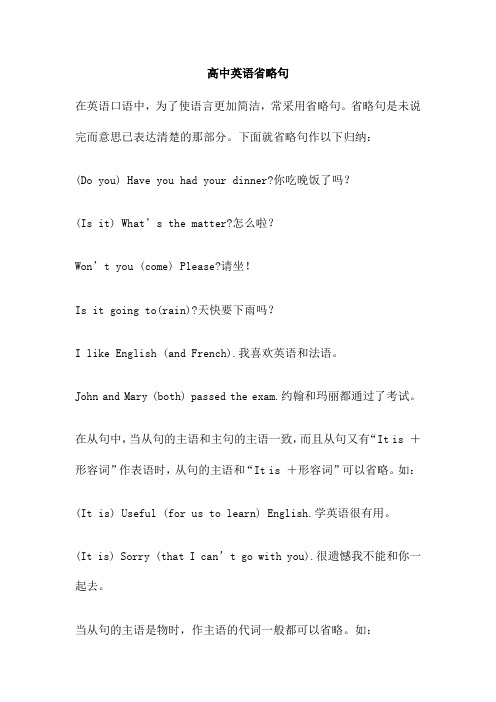
高中英语省略句在英语口语中,为了使语言更加简洁,常采用省略句。
省略句是未说完而意思已表达清楚的那部分。
下面就省略句作以下归纳:(Do you) Have you had your dinner?你吃晚饭了吗?(Is it) What’s the matter?怎么啦?Won’t you (come) Please?请坐!Is it going to(rain)?天快要下雨吗?I like English (and French).我喜欢英语和法语。
John and Mary (both) passed the exam.约翰和玛丽都通过了考试。
在从句中,当从句的主语和主句的主语一致,而且从句又有“It is +形容词”作表语时,从句的主语和“It is +形容词”可以省略。
如:(It is) Useful (for us to learn) English.学英语很有用。
(It is) Sorry (that I can’t go with you).很遗憾我不能和你一起去。
当从句的主语是物时,作主语的代词一般都可以省略。
如:The book (that I read yesterday) is very interesting.我昨天读的那本书很有趣。
在定语从句中,当先行词在定语从句中作状语时,关系代词可以省略。
如:The way (that/which) we use is more convenient.我们使用的方法更简便。
The reason (why) he was late is that he had to help the old lady across the street.他迟到的原因是他得帮助那位老太太过马路。
在一些表示建议、请求、命令等含义的动词后的宾语从句中,谓语动词常省略。
如:I suggest (that) we (should) discuss the matter.我建议我们讨论这个问题。
高中英语知识点归纳省略句的种类与用法
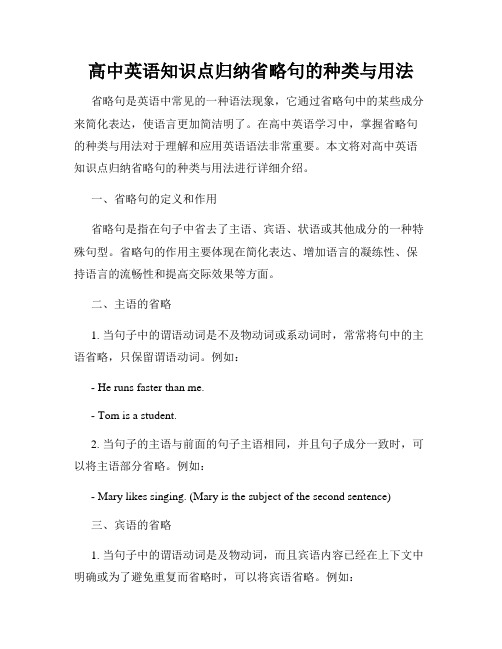
高中英语知识点归纳省略句的种类与用法省略句是英语中常见的一种语法现象,它通过省略句中的某些成分来简化表达,使语言更加简洁明了。
在高中英语学习中,掌握省略句的种类与用法对于理解和应用英语语法非常重要。
本文将对高中英语知识点归纳省略句的种类与用法进行详细介绍。
一、省略句的定义和作用省略句是指在句子中省去了主语、宾语、状语或其他成分的一种特殊句型。
省略句的作用主要体现在简化表达、增加语言的凝练性、保持语言的流畅性和提高交际效果等方面。
二、主语的省略1. 当句子中的谓语动词是不及物动词或系动词时,常常将句中的主语省略,只保留谓语动词。
例如:- He runs faster than me.- Tom is a student.2. 当句子的主语与前面的句子主语相同,并且句子成分一致时,可以将主语部分省略。
例如:- Mary likes singing. (Mary is the subject of the second sentence)三、宾语的省略1. 当句子中的谓语动词是及物动词,而且宾语内容已经在上下文中明确或为了避免重复而省略时,可以将宾语省略。
例如:- Can you speak French? Yes, I can. (French is the object of speak)四、状语的省略1. 当句子中的状语从句与主句的主语或宾语一致时,可以将状语从句中的主语或宾语省略。
例如:- He speaks English better than I (do). (I is the subject of do)- She likes swimming more than her sister (does). (Her sister is the subject of does)2. 当句子中的状语从句与主句的谓语动词一致时,可以将状语从句中的谓语动词省略。
例如:- I work harder than you (do). (Do is the verb of the subordinate clause)五、被动语态的省略1. 当句子中的被动语态中的被动助动词和be动词前面有介词时,可以将be动词和介词省略。
高中英语省略句专练
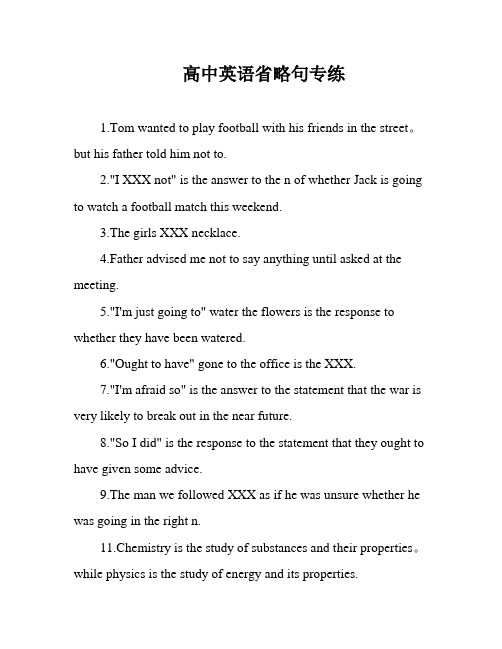
高中英语省略句专练1.Tom wanted to play football with his friends in the street。
but his father told him not to.2."I XXX not" is the answer to the n of whether Jack is going to watch a football match this weekend.3.The girls XXX necklace.4.Father advised me not to say anything until asked at the meeting.5."I'm just going to" water the flowers is the response to whether they have been watered.6."Ought to have" gone to the office is the XXX.7."I'm afraid so" is the answer to the statement that the war is very likely to break out in the near future.8."So I did" is the response to the statement that they ought to have given some advice.9.The man we followed XXX as if he was unsure whether he was going in the right n.11.Chemistry is the study of substances and their properties。
(整理版高中英语)二十三省略和插入语

二十三.省略和插入语一.省略为了使讲话和行文简洁,句中某些成分有时可省略。
省略可分以下几种情况:〔一〕简单句中的省略1、省略主语:祈使句中主语通常省略。
其它省略主语多限于少数现成的说法。
e.g. (I) Thank you for your help.〔括号内为省略的词语,下同〕(I) See you tomorrow. (It) Doesn't matter.2、省略主谓语或主谓语的一局部。
e.g. (There is) No smoking. (Is there) Anything wrong?Why (do you) not say hello to him?3、省略作宾语的不定式短语,只保存to。
e.g. ---- Are you going there?---- I'd like to (go there).He did not give me the chance, though he如果该宾语是be动词或完成时态,那么须be/have been或have。
e.g. ---- Are you an engineer?---- No, but I want to be.---- He hasn't finished the task yet.---- Well, he ought to have.4、省略表语。
e.g. ---- Are you thirsty?---- Yes, I am (thirsty).5、同时省略几个成分。
e.g. Let's meet at the same place as (we met)yesterday.---- Have you finished your work?---- (I have) Not (finished my work) yet.〔二〕并列句中的省略两个并列分句中后一分句常省略与前一分句相同的局部。
高中英语省略句
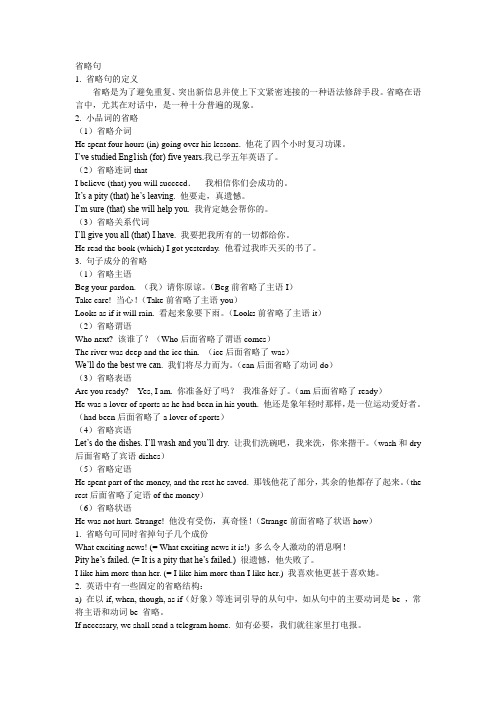
省略句1. 省略句的定义省略是为了避免重复、突出新信息并使上下文紧密连接的一种语法修辞手段。
省略在语言中,尤其在对话中,是一种十分普遍的现象。
2. 小品词的省略(1)省略介词He spent four hours (in) going over his lessons. 他花了四个小时复习功课。
I’ve studied Eng1ish (for) five years.我已学五年英语了。
(2)省略连词thatI believe (that) you will succeed.我相信你们会成功的。
It’s a pity (that) he’s leaving. 他要走,真遗憾。
I’m sure (that) she will help you. 我肯定她会帮你的。
(3)省略关系代词I’ll give you all (that) I have. 我要把我所有的一切都给你。
He read the book (which) I got yesterday. 他看过我昨天买的书了。
3. 句子成分的省略(1)省略主语Beg your pardon. (我)请你原谅。
(Beg前省略了主语I)Take care! 当心!(Take前省略了主语you)Looks as if it will rain. 看起来象要下雨。
(Looks前省略了主语it)(2)省略谓语Who next? 该谁了?(Who后面省略了谓语comes)The river was deep and the ice thin. (ice后面省略了was)We’ll do the best we can. 我们将尽力而为。
(can后面省略了动词do)(3)省略表语Are you ready? Yes, I am. 你准备好了吗?我准备好了。
(am后面省略了ready)He was a lover of sports as he had been in his youth. 他还是象年轻时那样,是一位运动爱好者。
高中英语语法——省略句(26张PPT)

please.
的一部分)
A: Would you like to
come to the party? B: I’d love to (come the
party).
不定式后 省略动词
They do not visit their parents
as much as they ought to (visit
பைடு நூலகம்
— Well, her parents wouldn’t allow
her to go to the party, but she
still _____.
A. hopes to
B. hopes so
C. hopes not
D. hopes for
(江苏2017)
4. — Have you got any particular
You can borrow my first aid notes if you want to (borrow my first aid notes).
不定式后省略动词
7) Sounds like a good idea. (It) sounds like a good idea.
8) Anything I can do for you? (Is there) anything I can do for you?
5. Sorry to hear that. I’m sorry to hear that.
6. Pity you couldn’t come.
It’s/ What a pity you couldn’t come. 7. This way, please.
Step this way, please.
省略句(完整归纳)

多变的省略句高考常考内容:1.省略主语,主谓语或主谓的一部分 2.不定式符号to的省略 3.不定式结构中动词的省略4.状语从句中的省略5.定语从句中关系词的省略6.虚拟语气中if和should的省略7.考查not, so, neither, nor的“替代性”省略掌握好省略句,应注意以下几条:1.感官动词或使役动词(如:notice, hear, let, make)等后接不定式作宾补时省略to,被动时to不能省略。
2.在pre fer to do rather than…, cannot help but…do, nothing …but等句型中常省略to。
3.为避免重复,作某些动词(hope, want)等宾语或(tell, order, ask)的宾补时,省略不定式短语,只保留to.4.应注意状语从句、定语从句中的省略。
5.注意not ,so ,neither, nor的“替代性”省略。
6.状语从句中,如果谓语含动词be,主语又与主句主语一致或主语是it,从句中主语和be一齐省略。
7.常见的省略形式:(1)If (it is)possible[如果可能的话];(2)If (it is) necessary[如果必要的话];(3)If any: 例: Correct the mistakes in the passage if (there is) any (mistakes)比较:Do you have anything to say? (不知道对方是否有话要说,) Do you have something to say?(认为对方有话要说.)一、替代省略1. 用it, one, that,ones, those替代句子中重复出现的名词、代词或句子。
one是指代同名称的另一样东西(同类异物),代替前面句子中重复出现的可数名词;that替代特指可数或不可数名词,后面常跟有in或of短语作后置定语;it指代同名称的同样事物(同类同物)。
高中英语省略句
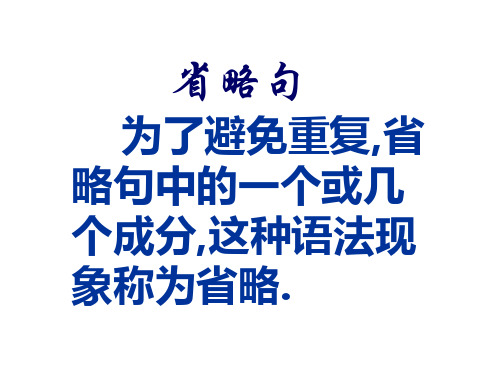
为了避免重复, 省略句中的一个或 几个成分,这种语法 现象称为省略.
1. 句首主语的省略。
( I ) Beg your pardon. ( It ) Sounds like a good idea. ( He ) Looks just like his father. ( It ) Doesn’t matter. ( He ) Hasn’t come. ( It ) won’t work. ( He ) Must be asleep. ( She) Can’t know it. 2. 在疑问句中,可将主语和be动词或助动词一 并省略。 ( Is it ) Raining hard? ( Have you ) Seen the film?
8.复合句中的省略。在对话中答句省去整个主 句只用从句。
1) --Shall I go to play?
--If you like (you can go to play).
-- Not until Mary came. ( =I didn’t leave until Mary came.)
-- Is that Peter?
-- No, I think not/ don’t think so.(=I don’t think that it is Peter.)
6.不定式后省略动词 A: Would you like to come to the party? B: I’d love to (come to the party).
5. Did she pass the first aid test that she did yesterday or didn’t she pass? or not.
6. She could not decided whether to send him to hospital or not to send him to hospital . 7. When your nose is bleeding, you should bend forward so that the blood runs out of your nose and the blood doesn’t run down youryour throat. not down throat. 8. Only some of the students have done a first aid course but most of the students haven’t done a first aid course .
- 1、下载文档前请自行甄别文档内容的完整性,平台不提供额外的编辑、内容补充、找答案等附加服务。
- 2、"仅部分预览"的文档,不可在线预览部分如存在完整性等问题,可反馈申请退款(可完整预览的文档不适用该条件!)。
- 3、如文档侵犯您的权益,请联系客服反馈,我们会尽快为您处理(人工客服工作时间:9:00-18:30)。
省略句1.省略句的定义省略是为了避免重复、突出新信息并使上下文紧密连接的一种语法修辞手段。
省略在语言中,尤其在对话中,是一种十分普遍的现象。
2.词的省略(1)省略介词He spent four hours (in) going over his lessons. 他花了四个小时复习功课。
I’ve studied Eng1ish (for) five years.我已学五年英语了。
(2)省略连词thatI believe (that) you will succeed.我相信你们会成功的。
It’s a pity (that) he’s leaving. 他要走,真遗憾。
I’m sure (that) she will help you. 我肯定她会帮你的。
(3)省略关系代词I’ll give you all (that) I have. 我要把我所有的一切都给你。
He read the book (which) I got yesterday. 他看过我昨天买的书了。
3.句子成分的省略(1)省略主语Beg your pardon. (我)请你原谅。
(Beg前省略了主语I)Take care! 当心!(Take前省略了主语you)Looks as if it will rain. 看起来象要下雨。
(Looks前省略了主语it)(2)省略谓语Who next? 该谁了?(Who后面省略了谓语comes)The river was deep and the ice thin. (ice后面省略了was)We’ll do the best we can. 我们将尽力而为。
(can后面省略了动词do)(3)省略表语Are you ready? Yes, I am. 你准备好了吗?我准备好了。
(am后面省略了ready)He was a lover of sports as he had been in his youth. 他还是象年轻时那样,是一位运动爱好者。
(had been后面省略了a lover of sports)(4)省略宾语Let’s do the dishes. I’ll wash and you’ll dry. 让我们洗碗吧,我来洗,你来揩干。
(wash和dry 后面省略了宾语dishes)(5)省略定语He spent part of the money, and the rest he saved. 那钱他花了部分,其余的他都存了起来。
(the rest后面省略了定语of the money)(6)省略状语He was not hurt. Strange! 他没有受伤,真奇怪!(Strange前面省略了状语how)4. 从句的省略✓名词性从句1)名词性wh-从句中的省略现象。
如果从句谓语与主句谓语相同,从句可省略全部谓语,甚至主语也可省略,只保留一个wh-词。
She will go to Beijing, but I do n’t know when (she will go to Beijing).她要去北京,但我不知道是什么时候。
She can’t come, but I don’t know why (she can’t come).她不能来,但我不知为什么。
wh-从句若是被动结构,主谓语也可全部省略,只保留by+wh词。
The cup was broken by someone, but I wonder (the cup was broken) by whom.这个杯子被某人打碎了,但我纳闷是被谁打碎的。
如果从句相同而wh-词不同,则可省略第一个从句而把两个wh-词连接起来。
I don’t know when (to meet him) and where to meet him.我不清楚什么时间、什么地点见他。
2)在与表示命令、愿意、建议等相关的名词性从句中,常用should型虚拟,而从句谓语部分中的should常省略。
We require that he (should) tell us the truth.我们要求他告诉我们真相。
3)在句型“It is necessary/surprising/suggested/natural /strange…+ that从句”中,从句通常用should型虚拟,而should常常可以省略。
Everyone thinks it is necessary that our research group(should)begin the experiment at once.每个人都认为我们的研究小组立刻开始实验是必要的。
4)在宾语从句中,连词that常可省略。
但如果有两个宾语从句,第二个宾语从句的that不能省;如果宾语从句和主句谓语之间有插入语时,that也不能省略。
I believe (that) you will succeed.我认为你会成功。
5)名词性从句的省略结构,即“wh- + to do sth.”。
通常这样的省略结构适应于从句的主语与主句的主语一致的情况。
I don’t know what to do next.我不知道下一步做什么。
How to deal with the matter has not been decided.如何处理这件事还没有定下来。
✓形容词性从句(定语从句)中的省略1)当关系代词在非限制性定语从句中作宾语时,常被省略。
Do you remember the place (which /that) we visited last year?你记得我们去年参观的那个地方吗?2)当先行词为way, direction等词时,其后面定语从句中的that, which, 或介词+which等常被省略。
Do you know the way (in which) work is measured?你知道衡量工作的方式吗?3)某些定语从句的省略结构,即“介词+ which/whom +不定式”Can you find me a room in which to live?你能给我找个住的房间吗?He is a good person to whom to turn.他是一个能向他求助的好人。
✓副词性从句(状语从句)的省略状语从句的省略原则主要是:如果从句中的主语和主句中的主语一致,就可以经过一定的变动把状语从句中的主语和谓语的一部分或全部省略,从而使语言更加简洁、明了。
1)时间状语从句中的省略注:as在引导时间状语从句时,没有这种省略现象。
我们不可说As walking, she found a nice shining thing on the ground.When (she was) very young, she began to learn to play the piano.While (I was) at college, I began to know him, a strange but able student. 我在上大学时就开始认识他,一个奇怪但有能力的学生。
When arriving, send me a telegram. (When you arrive, send me a telegram.)到达之后,来个电报。
Before leaving, turn off all the lights. (Before you leave, turn off all the lights.)走之前,请关闭所有的灯。
Don’t come in until (you are) asked to. 不叫你请你不要进来。
Whenever (it is )possible, you should come and help. 不管什么时候只要有可能就来帮忙。
You should let us know the result as soon as(it is) possible. 你应尽快让我们知道结果。
2)地点状语从句中的省略地点状语从句的省略常用下列结构:where(ver) possible, where(ver) necessary,Lay these books where possible you can find them easily.把这些书放在你可能容易找到的地方。
Put in articles wherever necessary in the following passages.在下列文中需要的地方填入冠词。
3)条件状语从句中的省略常用的句型是:if necessary, if possible, if true, if anyone等。
如:Send the goods now if (they are) ready. 货物如果准备好了,请送过来。
He will come if (he is) asked. 如果叫他来,他就来。
If (it is) necessary, ring me at home. 如果有可能,朝我家里打电话。
Come along with me if (it is) possible. 如果有可能和我一起去吧.。
If (it is) true, this will casue us a lot of trouble. 如果是真的,这会给我们带来很多麻烦。
There are few people nowadays, if (there are) any, who remember him. 很少有人能记起他。
You should stay where you are, unless (you are) asked to leave. 你应呆在你现在的地方不动,除非叫你动。
4)让步状语从句中的省略He is a good man, though sometimes (he is) rather dull. 他真是个好人,尽管有时有点无聊。
Even if (I am ) invited to, I won’t go to such a bad lecture. 即使邀我去,我都不想听如此坏的报告。
5)比较状语从句中的省略She can play the piano just as wonderfully as you (do). 她钢琴弹的我你弹的一样好。
She has finished the work earlier than (it has been ) expected. 她这项工作比预料的提前完成。
6)方式状语从句中的省略as if/as though后还可加n./a./ad./介词短语/现在分词/过去分词/不定式。
